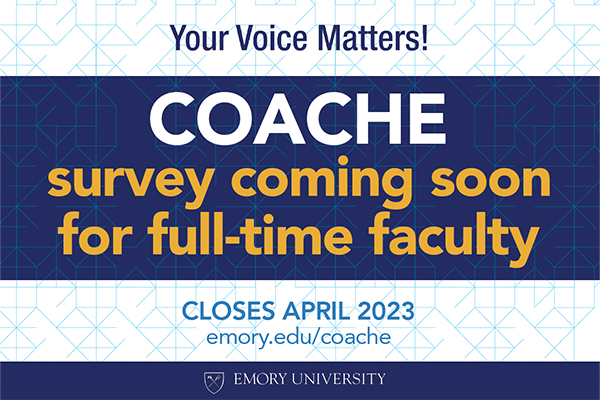This February, eligible tenure track and CRT faculty will receive in their inboxes a personalized link leading them to a confidential faculty satisfaction survey, which the Office of the Provost and Faculty Affairs conducts in partnership with The Collaborative on Academic Careers in Higher Education (COACHE), an operation of Harvard’s Graduate School of Education.
Open from mid-February through April, the COACHE survey provides faculty with the opportunity to give voice to their experience with topics ranging from shared governance to mentorship and tenure and promotion; completion takes approximately 25 minutes.
“Your voice matters,” says COACHE steering committee chair Pearl Dowe, when asked about the most important thing faculty need to know about the survey.
“University leaders and the COACHE steering committee rely on results from the COACHE survey to make recommendations and plans that support inclusive faculty eminence,” continues Dowe, who is also vice provost for faculty affairs and Asa Griggs Candler Professor of Political Science and African American Studies.
COACHE offers participating institutions the opportunity to receive the results of five peer institutions drawn from the more than 250 colleges, universities, systems and consortia in the U.S. and Canada that belong to the research-practice partnership. These shared results allow schools to benchmark themselves against their peers and offer faculty a sense of their workplace perceptions relative to the national labor market.
Discussing the timeline for this year’s survey, Justin Shepherd, associate vice provost for institutional research and decision support (IRDS) and steering committee member, expects to receive survey data from the Harvard COACHE team in August. Once the data is received, Institutional Research and Data Support can begin its work of analysis and formulating recommendations.
“Survey results and recommendations addressing the university and individual schools will be shared with Emory faculty throughout the 2023-2024 academic year. In spring 2024, schools will be tasked with creating plans to address recommendations through specific action items,” Shepherd says.
When asked to highlight their most important work in response to 2020 survey results, the School of Law, Oxford College and Rollins School of Public Health (RSPH) all cited efforts related to faculty compensation.
- A competitive job market made it important for the School of Law to look closely at market data and the issue of salary compression as they relate to tenure track faculty, according to Joanna M. Shepherd, vice dean and Thomas Simmons Professor of Law.
- The relationship between compensation and retention was also top of mind for RSPH. Carmen Marsit, Rollins Distinguished Professor of Research and executive associate dean for faculty affairs and research strategy, cited concerns about salary equity and retention that led RSPH to “develop a framework to guide salary equity reviews and recognition programs in order to assure equity across the school and honor faculty success.”
- Oxford College, says Kristin Bonnie, senior associate dean of academic affairs and professor of psychology, initiated a salary comparison analysis for faculty in tenure track and CRT track positions.
Additionally, schools took action related to the caregiving responsibilities faculty hold beyond those related to their profession.
- Noting an earlier effort to address parental leave, Kathy Griendling, executive associate dean for faculty affairs and professional development and R. Wayne Alexander MD Professor of Medicine, takes pride in how the School of Medicine, whose faculty expressed their concerns in the 2020 survey, is now actively implementing the expanded parental leave policy in the school.
- Similarly, faculty at the Nell Hodgson Woodruff School of Nursing, the vast majority of whom are women, drew attention to their work/life balance. Affected by the advent of COVID-19 in spring 2020, nursing faculty highlighted the increased responsibility for family and caregiving. Laura Kimble, associate dean for academic operations and professor, clinical track, reported the school’s efforts to help redress the imbalance felt by faculty. To reduce faculty’s teaching burden, the school “engaged graduate students as Zoom managers. . . and supported even greater flexibility of work hours.”
Read more about how Emory schools responded to the 2020 COACHE survey at emory.edu/coache.
Ravi V. Bellamkonda, provost and executive vice president for academic affairs, appreciates the attention the COACHE survey draws to faculty concerns and satisfaction.

To access the COACHE faculty satisfaction survey during the week of Feb. 13, watch for an email from coachefaculty@abtassoc.com or coache@gse.harvard.edu that contains your personal survey link.
If you have questions, please see the Emory COACHE FAQ page or contact coache@emory.edu, the Emory COACHE steering committee, associate deans of faculty or coache@gse.harvard.edu.

